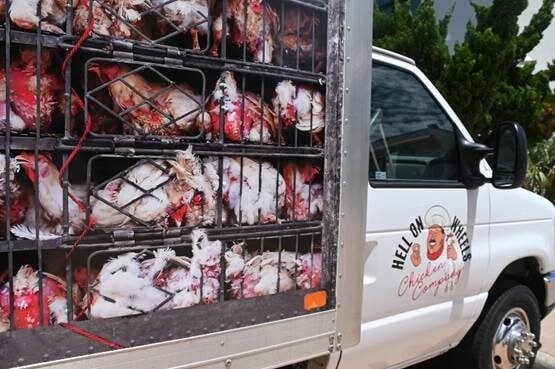1,000 Chickens Burned to Death at Costco Supplier’s Slaughterhouse
PETA just obtained U.S. Department of Agriculture documents revealing that 1,000 chickens were killed in a horrific fire that engulfed a chicken-transport truck at Costco supplier Lincoln Premium Poultry (LPP) in Fremont, Nebraska, on June 17. Of the 6,000 chickens caged on the trailer, 1,000 died and were “completely burnt” and another 1,500 were injured in the 50-minute fire.
According to the documents, the truck caught fire after the rear wheels “exploded” in “huge flames.” LPP management blamed the fire on overheated brakes, and an LPP whistleblower told PETA that they suspected the truck driver had left the emergency brake on.
LPP staff broke the necks of chickens who had escaped from the burning trailer and killed all other survivors by gassing them with carbon dioxide over the course of nearly four hours.
PETA is calling on the Dodge County Attorney’s Office to charge those responsible under state law, because federal officials haven’t prosecuted any inspected slaughterhouses for acts such as those at LPP since at least 2007.
This isn’t the first time chickens have died in egregiously cruel ways at LPP. In 2021, approximately 30,500 chickens were denied food and water for 25 hours on crowded transport trucks and at least 1,622 of them were found dead the next day—but Costco didn’t stop getting chicken from LPP after that incident. It just goes to show the suffering that chickens endure in the cut-rate meat industry.
Taking Action for Chickens
Chickens—who can recall the faces and social order of more than 100 other birds—should never be subjected to the cramped, extreme conditions of transport trucks, helpless to escape when their lives are so obviously in danger. But not all humans have moved past accepting this kind of cruelty, which the meat industry has made harder to document—in no small part through “ag-gag” laws that make it more difficult to expose. PETA’s “Hell on Wheels” truck brings the stark reality to the people: It exposes observers to the horrors that chickens who are killed for food endure on a daily basis.

The best way you can help reduce this kind of senseless suffering is by going vegan, which saves nearly 200 lives a year. Being vegan means you won’t participate in funding the industries that torment animals as LPP does—all with little to no oversight.
Another way you can help directly is by speaking out for chickens with a series of rapid actions. Every letter you send counts!

